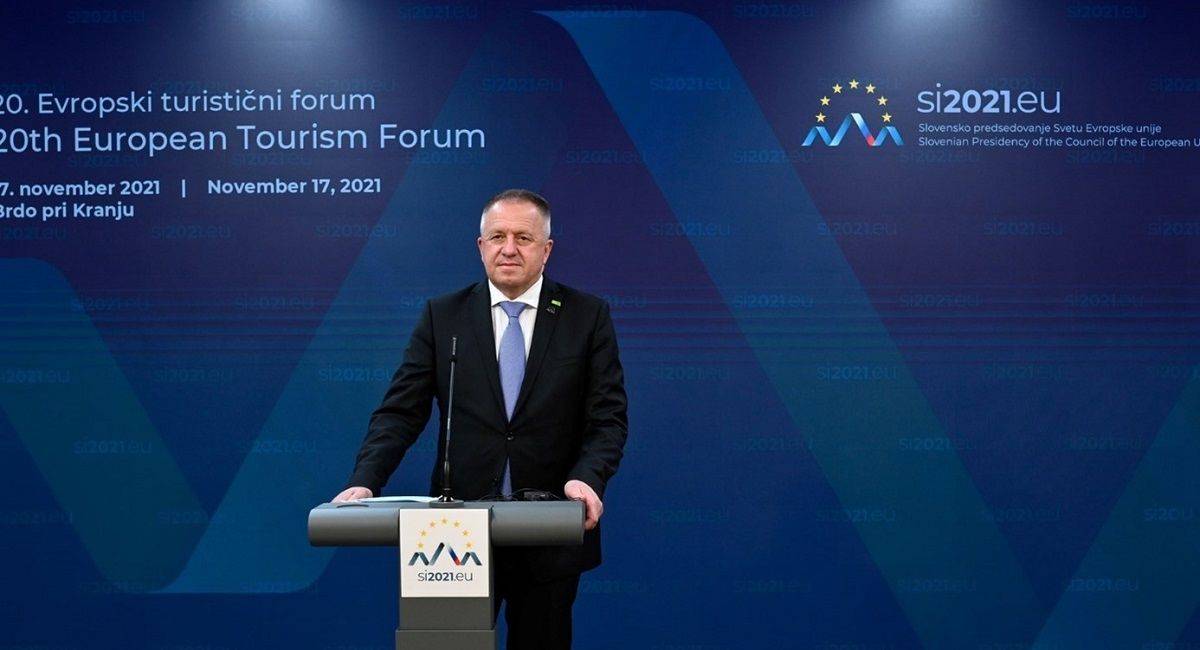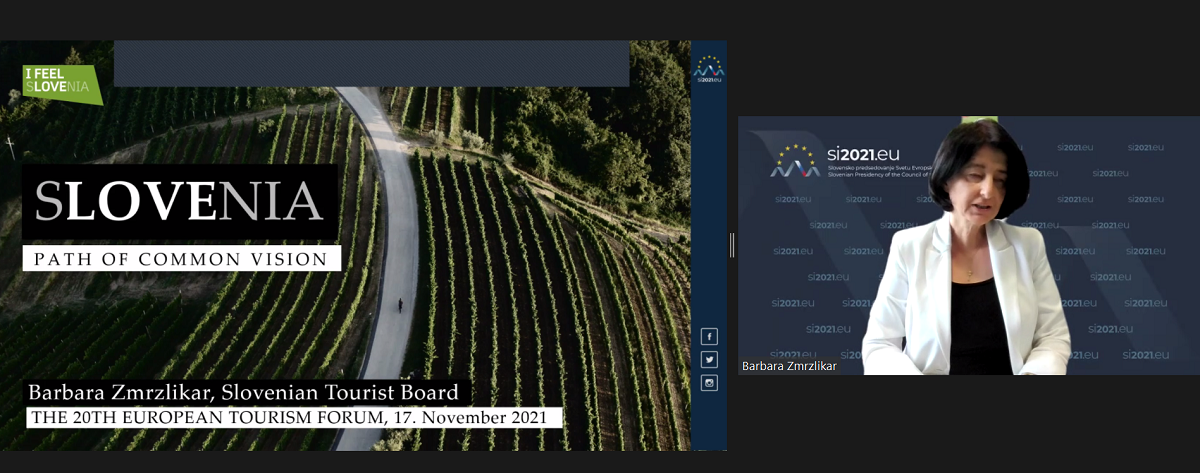- Media Centre
- Press releases
- European tourism industry and destinations on the path to sustainable and digital transformation
European tourism industry and destinations on the path to sustainable and digital transformation
European tourism industry and destinations on the path to sustainable and digital transformation
On Wednesday, 17 November, the 20th European Tourism Forum was held, organized by Slovenia as the presiding country of the EU Council in cooperation with the European Commission. The event followed an informal meeting of EU tourism ministers the day before.

The central theme of both events was the creation of the document "Pathways of Transition" for the green and digital transformation of the European tourism industry and destinations. Barbara Zmrzlikar from the Slovenian Tourist Board (STB) also participated in the forum by presenting Slovenia as a sustainable tourist destination.
Slovenia has been committed to the development of sustainable tourism for years. The most important milestone was set with the establishment of the Green Scheme of Slovenian Tourism, which is a national program in the field of sustainable tourism development. The scheme was established seven years ago and offers destinations and providers concrete tools for assessing and improving their performance in the field of sustainability, which enables them to fulfill the promise of the I feel Slovenia brand.

Within the European Tourism Forum, Barbara Zmrzlikar, Head of the Sector for Research, Development, Innovation and European Projects at the STB, presented the projects, activities and tools for implementing a sustainable commitment in Slovenian tourism, including the Green Scheme of Slovenian Tourism, the Water Commitment and the Commitment to Eliminate Disposable Plastics, which are of key importance for fulfilling the defined sustainable and digital transition for more sustainable Slovenian tourism.
As an example of good practice, the Green Scheme of Slovenian Tourism is presented to many countries not only in Europe but globally.
“The key strategic goal of the Green Scheme of Slovenian Tourism is the introduction of sustainable models in Slovenian tourism. The scheme is internationally comparable and based on more than 100 Green Destinations Standard criteria. There are already 199 holders of the SLOVENIA GREEN label in the green scheme. The ETC has identified the scheme as the best example of a sustainability certification scheme and included it in the Sustainable Tourism Implementation Handbook. As an example of good practice, we present it to many interested countries not only in Europe but globally. In the year when Slovenia holds the title of European Gastronomic Region 2021, the STB supplemented the Green Scheme with the Slovenia Green Cuisine label, which has already been awarded to more than 30 restaurants," said Barbara Zmrzlikar, adding that “STB's further goals and activities include activities to eliminate single-use plastics in Slovenian tourism.” She also emphasized the importance of digitalisation and digital transformation for even more successful and resilient tourism. Digitization and digital transformation are key elements of the strategy for the recovery and resilience of Slovenian tourism, and the Strategy for the Digital Transformation of Slovenian Tourism is in the final stage of development. The creation of a digital platform is also planned, which will enable the measurement of the impact of tourism on all pillars of sustainability and support the management of destinations in a more sustainable way.
"If we want to achieve the goals set out in the 2030 Agenda for Sustainable Development and create an environmentally and socially more sustainable society, we need to define new success indicators in tourism, which will include economic, environmental and social indicators," she concluded.
The 20th European Tourism Forum was opened by Minister of Economic Development and Technology Zdravko Počivalšek, who began the meeting by saying that the European Union had managed to take the first emergency measures in 2020 and 2021 to help the tourism industry due to the Covid-19 pandemic. “With this, we helped the tourist ecosystem to overcome the first shock. However, it is essential that these short-term measures are followed by long-term ones,” he emphasized: “The tourism ecosystem needs to be transformed into more resilient and sustainable in order to be ready for new market challenges and changing patterns of tourist consumer behaviour.”
At the 20th European Tourism Forum, the participants – European tourism stakeholders – were greeted by Minister of Economic Development and Technology Zdravko Počivalšek, Commissioner for Internal Market Thierry Breton, Director of Tourism and Proximity at the European Commission's Directorate-General for Internal Market, Industry, Entrepreneurship and SMEs (DG GROW) Valentina Superti and Vice-Chair of the Committee on Transport and Tourism (TRAN) in the European Parliament Dr. István Ujhelyi. The participants of the forum were also addressed by Secretary General of the United Nations World Tourism Organization (UNWTO) Zurab Pololikashvili as a special guest of the presiding country. Speakers highlighted the first signs of the recovery of European tourism this summer and the great importance of the global covid certification and vaccination in the recovery of tourism. They stressed the importance of restoring tourist confidence in travel for the successful recovery of tourism. They emphasized the need for a sustainable and digital transformation of European tourism for more successful and resilient tourism in the future. Inclusive mode of operation is also crucial for the success of tourism.
The first part of the meeting presented good practices already being implemented by tourism stakeholders to support the sustainable transition of EU tourism in order to set a good example and invite other stakeholders to do the same. The Green Scheme of Slovenian Tourism, implemented by the Slovenian Tourist Board, is of great interest and is an example of good practice not only in Europe but also worldwide. From Slovenia, Bohinj presented itself as a sustainable tourist destination. Good practices in the field of sustainability were presented by TUI and HOTREC. The first panel also emphasized the importance of training for sustainability and acquiring appropriate staff to work in tourism. It was also emphasized that when developing tourism, it is important to keep in mind the quality of life of the local population.
The objectives of the second part of the meeting were mainly to study the activities in the field of monitoring and documenting the development of the tourist ecosystem. Innovative best practices at sectoral and target level in tourism collection and reporting were also presented. Representatives of Eurostat and the Statistical Office of the Republic of Slovenia emphasized that statistical offices are not only collecting and analyzing data, but can also help identify and monitor indicators of the impact of tourism on the environment and the local population.
In the third part of the meeting, the advantages of digital innovations in tourism were presented. There was a discussion about how the private and public sectors can contribute to more innovative solutions in tourism. The winners of the European Capital of Smart Tourism 2022 project, Bordeaux and Valencia, were presented. Valencia presented an interesting information about the public-private partnership and the tourism foundation. They work closely with airlines and jointly plan the promotion of specific destinations. As part of this part of the meeting, Ljubljana, the capital of the country holding the presidency of the Council of the EU, which has a successful practice in the field of digitalisation, sustainability and innovative tourist products, also held a presentation.
“The 20th European Tourism Forum will contribute to our further cooperation and work for climate neutral, smart and innovative, responsible and inclusive tourism of the future, which will keep Europe at the forefront of the world tourism market in the long run.”
Closing remarks were made by State Secretary Simon Zajc and Head of the Tourism and Textiles Unit of DG Grow of the European Commission Ms. Marie-Helen Pradines. State Secretary Simon Zajc thanked all the organizers and participants of the European Tourism Forum and emphasized: “I am convinced that the discussions at today's 20th European Tourism Forum will contribute to our further cooperation and work for climate neutral, smart and innovative, responsible and inclusive tourism of the future, which will keep Europe at the forefront of the world tourism market in the long run.”
Green and digital transformation is the right path for the future of the tourism ecosystem
On Tuesday, 16 November 2021, an informal meeting of the Ministers of the Member States of the European Union for Tourism took place via an audiovisual link. The discussion focused on the "path of transition" for the green and digital transformation of the European tourism ecosystem by 2030.
At the meeting, the ministers discussed key measures for the preparation of a concrete set of measures for the recovery of the tourist ecosystem. These will represent the so-called recovery transition pathway, with a focus on promoting the green and digital transition of the tourism ecosystem.
They agreed that the essence of tourism recovery must be a green and digital transition and that we need to establish a sustainable and resilient tourism ecosystem. They emphasized the need to strengthen the resilience of European companies and industry in the light of future crises. They also emphasized the need to re-establish safe tourist travel and restore consumer confidence. They emphasized the importance of an open and well-functioning single market, which will ensure open transport routes, and spoke about the importance of financing the recovery of the tourism sector.
The ministers also spoke about the importance of education and training and the relevant retraining and additional training in the tourist ecosystem. It is crucial to provide the right skills to meet the challenges of digitalisation and the green transition.
An important part of the recovery and double transition is also the provision of adequate databases and common data spaces for data exchange. There is a need to strengthen innovation for the tourism ecosystem and accelerate business processes. In the discussion, ministers called for the differences in development between Member States and regions to be taken into account, as remote and island regions are specifics that also need sustainable and digital solutions. Ministers also called for the participation of all stakeholders in the recovery process at all levels. They emphasized the importance of exchanging good practices and the need to provide sufficient time to prepare for recovery measures.
At the end of the debate, the ministers agreed that the transition path provided a good basis for preparing a European agenda for tourism for the period 2030-2050. In conclusion, the presiding minister emphasized, among other things, that this discussion would make an important contribution to the continuation of efforts to complete the transition path for the recovery of the tourist ecosystem: "Given the Presidency's vision of the European tourism of the future – safe, green, smart, responsible, inclusive – I am proud that Slovenia committed itself to green and sustainable tourism even before the covid crisis. It is essential that the EU also embarks on a path of double transformation if we are to maintain Europe's global competitiveness and be the world's number one tourist destination. This must be our common goal!”
Contacts
Global public relations and Marketing
e-mail address: press(at)slovenia.info
